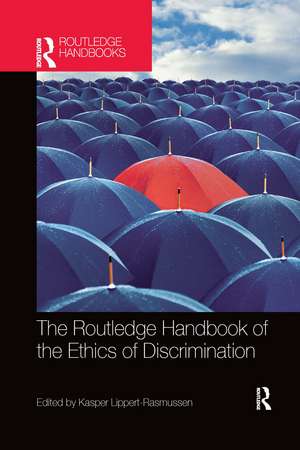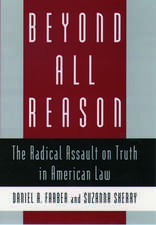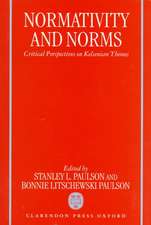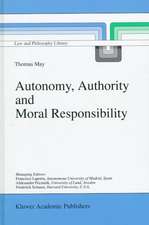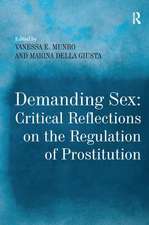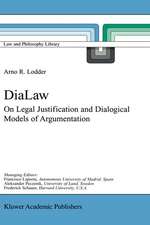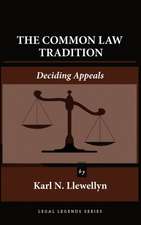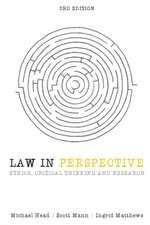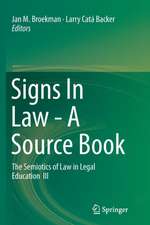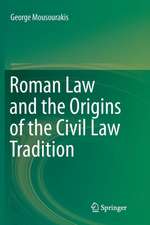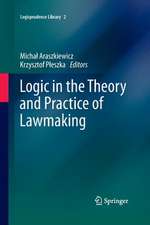The Routledge Handbook of the Ethics of Discrimination: Routledge Handbooks in Applied Ethics
Editat de Kasper Lippert-Rasmussenen Limba Engleză Paperback – 18 dec 2020
The Routledge Handbook of the Ethics of Discrimination is an outstanding reference source to this exciting subject and the first collection of its kind. Comprising over thirty chapters by a team of international contributors the handbook is divided into six main parts:
• conceptual issues
• the wrongness of discrimination
• groups of ‘discriminatees’
• sites of discrimination
• causes and means
• history of discrimination.
Essential reading for students and researchers in applied ethics and political philosophy the handbook will also be very useful for those in related fields, such as law, sociology and politics.
| Toate formatele și edițiile | Preț | Express |
|---|---|---|
| Paperback (1) | 430.09 lei 6-8 săpt. | |
| Taylor & Francis – 18 dec 2020 | 430.09 lei 6-8 săpt. | |
| Hardback (1) | 1216.17 lei 6-8 săpt. | |
| Taylor & Francis – 23 aug 2017 | 1216.17 lei 6-8 săpt. |
Preț: 430.09 lei
Nou
Puncte Express: 645
Preț estimativ în valută:
82.31€ • 85.61$ • 67.95£
82.31€ • 85.61$ • 67.95£
Carte tipărită la comandă
Livrare economică 14-28 aprilie
Preluare comenzi: 021 569.72.76
Specificații
ISBN-13: 9780367735883
ISBN-10: 0367735881
Pagini: 476
Dimensiuni: 174 x 246 x 24 mm
Greutate: 0.78 kg
Ediția:1
Editura: Taylor & Francis
Colecția Routledge
Seria Routledge Handbooks in Applied Ethics
Locul publicării:Oxford, United Kingdom
ISBN-10: 0367735881
Pagini: 476
Dimensiuni: 174 x 246 x 24 mm
Greutate: 0.78 kg
Ediția:1
Editura: Taylor & Francis
Colecția Routledge
Seria Routledge Handbooks in Applied Ethics
Locul publicării:Oxford, United Kingdom
Public țintă
Postgraduate and UndergraduateCuprins
The philosophy of discrimination: an introduction (Kasper Lippert-Rasmussen). Part I: Conceptual issues. Chapter 1: Direct discrimination (Frej Klem Thomsen). Chapter 2: Indirect discrimination (Tarunabh Khaitan). Chapter 3:Statistical (and non-statistical) discrimination (Fred Schauer). Chapter 4: Epistemic discrimination (Katherine Puddifoot). Chapter 5: Discrimination and intersectionality (Natalie Stoljar). Part II: The wrongness of discrimination. Chapter 6: Discrimination and respect (Erin Beeghly). Chapter 7:Discrimination and social meaning (Deborah Hellman). Chapter 8: Discrimination and irrelevance (Lena Halldenius). Chapter 9: Discrimination and desert (Andres Moles). Chapter 10: Discrimination and rights (Peter Vallentyne). Chapter 11: Discrimination and equality of opportunity (Carl Knight). Chapter 12: Discrimination and harm (Richard Arneson). Chapter 13: Discrimination and freedom (Sophia Moreau). Chapter 14: Discrimination and virtue (J. L. A. Garcia). Part III: Groups of discriminates. Chapter 15: Discrimination and gender (Gina Schouten). Chapter 16: Discrimination and race (Patrick S. Shin). Chapter 17: Discrimination and religion (Sune Lægaard).Chapter 18: Discrimination and sexual orientation (Edward Stein). Chapter 19: Discrimination and disability (Sean Aas and David Wasserman). Chapter 20: Discrimination and age (Juliana Bidadanure). Chapter 21: Discrimination and immigration (José Jorge Mendoza). Chapter 22: Discrimination and obesity (Garrath Williams). Chapter 23: Discrimination and lookism (Xiaofei Liu). Chapter 24: Discrimination and trans identities (Mari Mikkola). Part IV: Sites of discrimination. Chapter 25: Discrimination and the job market (Sarah Goff). Chapter 26: Discrimination and education (Gideon Elford). Chapter 27: Discrimination and law enforcement (Re’em Segev). Chapter 28: Discrimination and insurance (Ronen Avraham). Chapter 29: Discrimination and politics (Nenad Stojanović). Chapter 30: Discrimination and the private sphere (Hugh Collins). Chapter 31: Discrimination and the personal sphere (Paul Butterfield and Hugh Lazenby). Part V: Causes and means. Chapter 32: The social psychology of discrimination (Jules Holroyd). Chapter 33: Discrimination and affirmative action (Julie Suk). Chapter 34: Discrimination and diversity (George Hull). Chapter 35: Wrongful private discrimination and the egalitarian ethos (Carina Fourie). Part VI: History. Chapter 36: Discrimination: word, concept, anti-norm - some historical sketches (Robert Fullinwider). Index
Notă biografică
Kasper Lippert-Rasmussen is professor in political theory at University of Aarhus, Denmark, professor II in philosophy at University of Tromsø, Norway and Associate Editor of Ethics. His main work on discrimination is Born Free and Equal? (Oxford University Press, 2013).
Recenzii
"This is a comprehensive state of the art collection of essays on the ethics of discrimination that will be an invaluable resource for both researchers and students."
Andrew Mason, University of Warwick, UK.
"This volume brings together a set of essays that combine rigorous conceptual analysis and incisive legally and empirically informed approaches on discrimination. Together they provide an indispensable, and timely, guide to understanding and disentangling the philosophical issues that surround the topic of discrimination in all its theoretical and normative dimensions. The Routledge Handbook of the Ethics of Discrimination is the most comprehensive resource to date for all who want to understand what discrimination exactly amounts to and how it bears on current social inequalities."
Magali Bessone, Université de Rennes I, France.
Andrew Mason, University of Warwick, UK.
"This volume brings together a set of essays that combine rigorous conceptual analysis and incisive legally and empirically informed approaches on discrimination. Together they provide an indispensable, and timely, guide to understanding and disentangling the philosophical issues that surround the topic of discrimination in all its theoretical and normative dimensions. The Routledge Handbook of the Ethics of Discrimination is the most comprehensive resource to date for all who want to understand what discrimination exactly amounts to and how it bears on current social inequalities."
Magali Bessone, Université de Rennes I, France.
Descriere
The Routledge Handbook of the Ethics of Discrimination addresses the following questions: what distinguishes the concept of discrimination from the concept of differential treatment? What distinguishes direct from indirect discrimination? Is discrimination always morally wrong? How should we eliminate the effects of discrimination?
